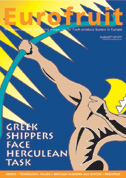
Eurofruit (full title Eurofruit Magazine) is a monthly global trade marketing magazine for the European fresh fruit and vegetable sector. [1] [2]

Eurofruit (full title Eurofruit Magazine) is a monthly global trade marketing magazine for the European fresh fruit and vegetable sector. [1] [2]
Eurofruit was founded in 1992. [3] The publication is aimed at buyers, exporters, importers, distributors and producers of fresh produce, be it sold in Europe or exported from it. The magazine is published from London. [1] It also has two sister titles, Asiafruit Magazine (based in Melbourne) and Americafruit Magazine (London), which are aimed at the Asian import-export market and the North American import market respectively. The publisher of these magazines is Market Intelligence Ltd. [4]